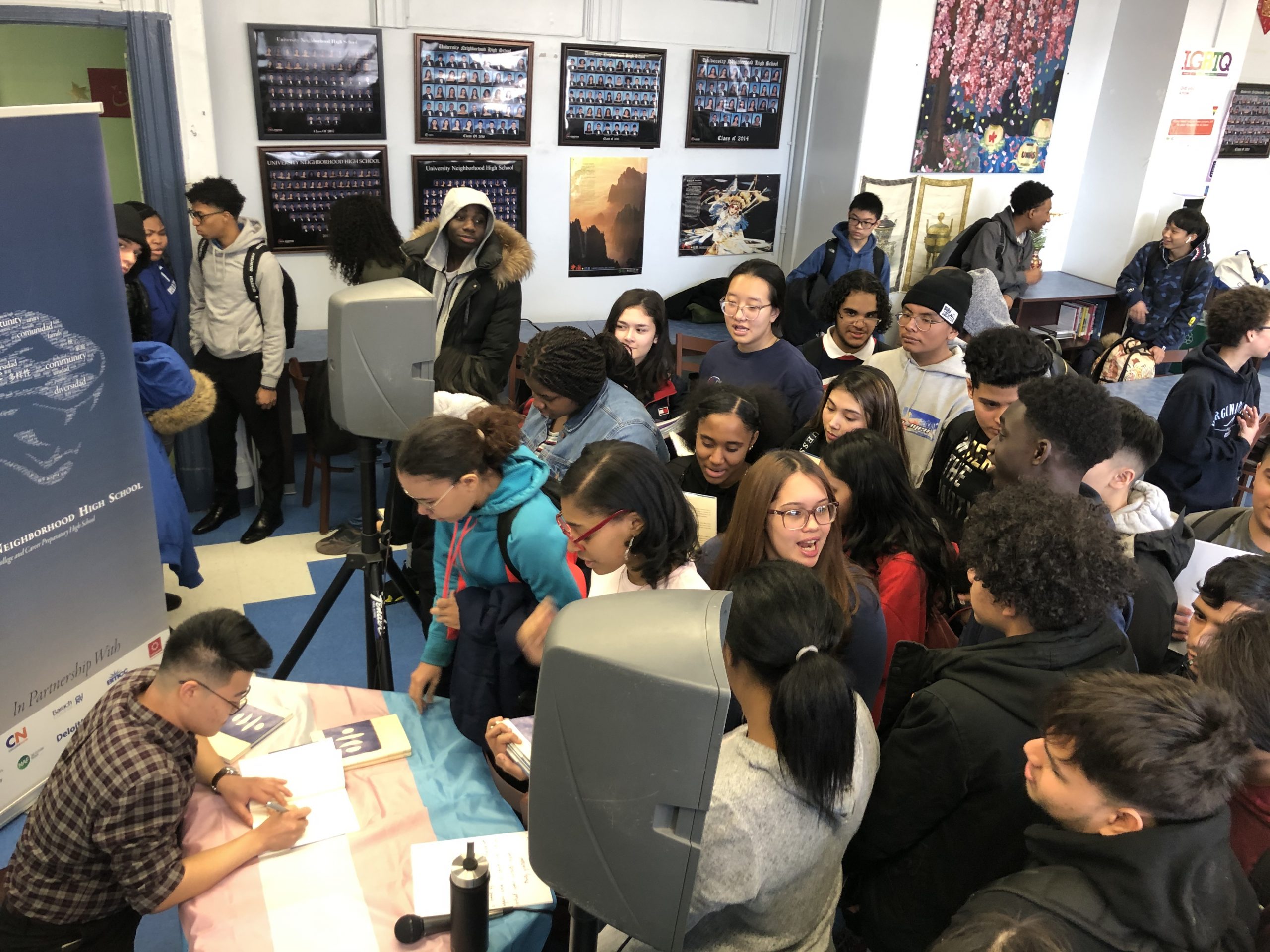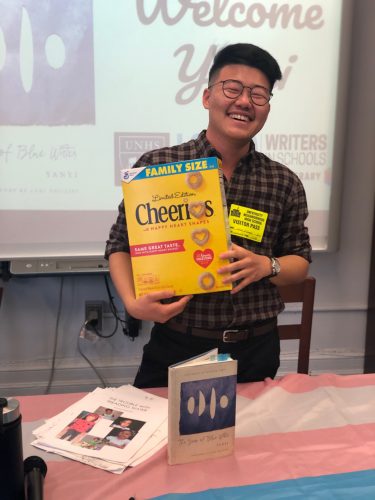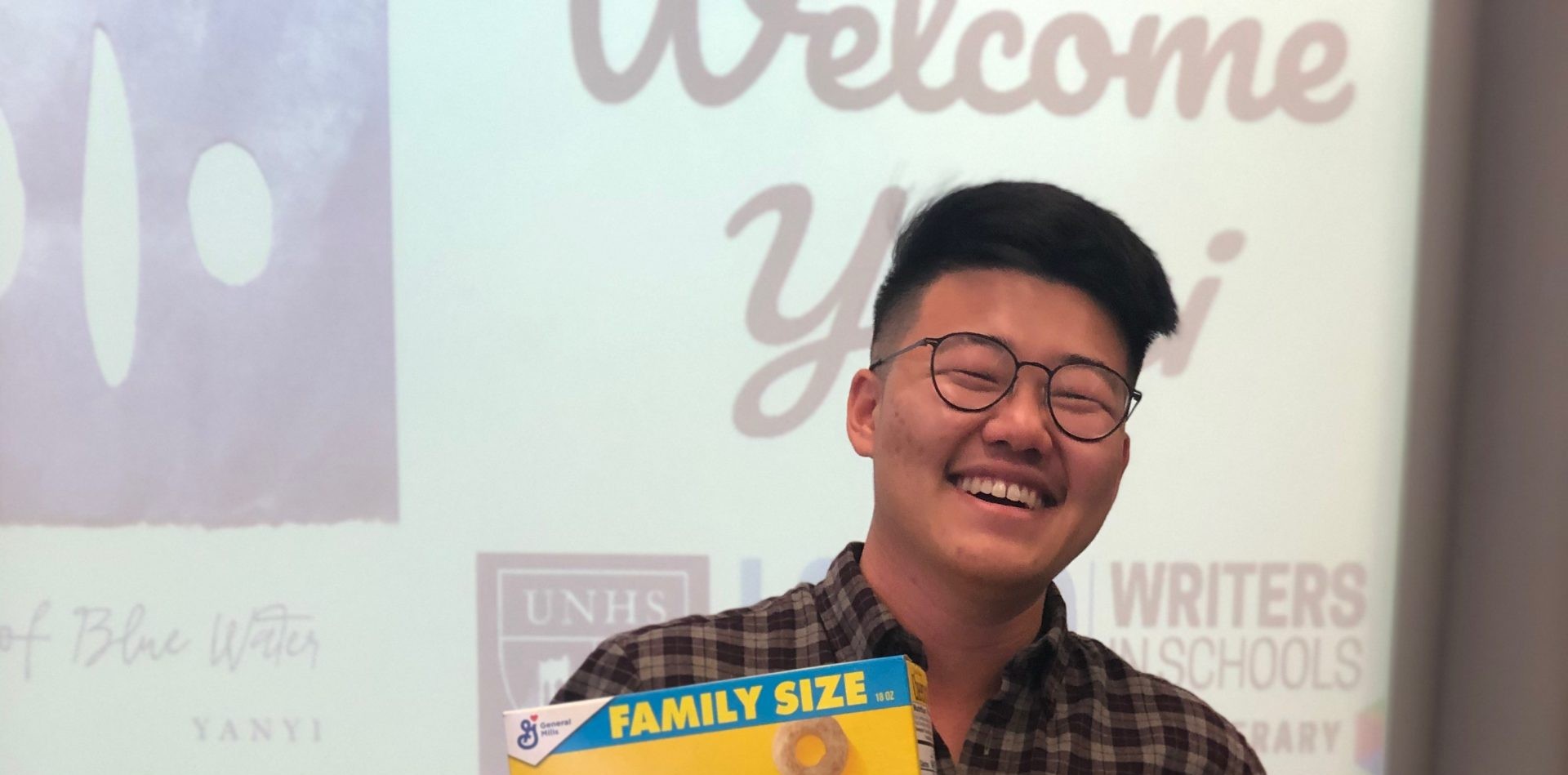Back to School with Poet Yanyi

Author: Sue Landers
August 27, 2020
As we enter back-to-school season, we wanted to share a look inside Lambda’s LGBTQ Writers in Schools Program, which brings LGBTQ authors into classrooms to read and discuss their work.
LGBTQ youth are twice as likely as non-LGBTQ youth to experience bias at school, but in schools that offer LGBTQ-inclusive programs, queer and trans youth are more likely to experience acceptance. Lambda’s LGBTQ Writers in Schools Program provides critically necessary, safe spaces for youth to talk about books, queer life, and how to thrive as a LGBTQ person. As one of the NYC public school teacher, Shelley Cunningham, put it: “LGBTQ books save lives. They give LGBTQ youth a sense of belonging and teach those who are not LGBTQ how to support those who are.”
Last year, we brought dozens of contemporary LGBTQ authors into schools both in person and virtually to meet with students. One of those authors, the award winning poet Yanyi, shared his thoughts with Lambda’s Executive Director, Sue Landers, on his experience sharing his work with students.
What delighted or surprised you about your visits to schools?
Oh, I was surprised and delighted by everything. I expected to be addressing one period of one class, do a quiet Q&A, and then be shuffled off. The teachers and librarians I worked with this year went far and beyond this expectation: my visit was an event at every school I attended.
David Whitman, the teacher at University Neighborhood High School, had taught my book to every single period of his English class—students were given permission to leave other classes just to attend and filled the entire library. When I arrived, there was a microphone setup and a projection of my book behind me, and free copies of the book atop a trans pride flag.
I was flabbergasted. After my initial presentation, students started lining up and read out their responses to my work through their own poetry or art. Some of the students had gone through the trouble to purchase and wrap a gift for me: a box of Cheerios, which feature prominently in one of the poems of my book. Quite a few of us were crying. The connection was real.
There’s a educational concept known as “mirrors and windows,” which says that kids need stories that reflect their own experience as well as the experiences of others. Can you tell us how this is especially necessary for LGBTQ youth?
I co-founded a queer-straight alliance when I was in high school over a decade ago. I don’t remember knowing any adults who were queer or who could had shared, in particular, my experience as a Chinese American queer person. I do remember the assistant principal censoring a poem with a gay kiss in our literary magazine, other kids pulling down and ripping up our posters about LGBTQ bullying, and fighting for my rights anyway while in the closet at home.
I don’t write about those experiences in The Year of Blue Water, but they are implicit in the internalized transphobia and homophobia I work through in the book. They are implicit in the abuse I accepted further down the line in my life. Those fears showed up as a fear of myself, the belief that I was, deep-down, a truly horrible person. This book is written in the midst of that winding path of learning how to understand and cherish myself despite all that.
What role do you think poetry, in particular, plays in young queer people’s lives?
Most of our lives, we act based on fear or routine. Literature gives us another reason. Literature gives us access to each other. That’s the point of it, really. As a mentor of mine recently told me, the literature is incidental. Literature gets us love.
What, if any, LGBTQ books influenced you as a young person?
There’s a period of blurred-together summers in middle school and early on in high school when I swept through the young adult section of my town’s public library (the ceilings, still, are so high in my memory!). I honestly can’t say I remember most of them—probably because there weren’t that many available—and a short search for YA queer novels bring up lots of more recent titles, a wonderful problem. What I do remember is how voracious I was for it. I lurked on AfterEllen and followed the early days of Autostraddle. Somehow, my teenage self found and secretly watched the whole lesbian filmography up until then (the early 2000s) and stayed up late watching compiled clips of lesbian storylines from soap operas from around the world. The internet, with its message boards and blogs, made being in the closet a lot more bearable. Now, people have Lex and Instagram. I can’t even imagine.

What 5 books do you think LGBTQ young people should read?
The list always changes, but for now: The Price of Salt by Patricia Highsmith, Giovanni’s Room by James Baldwin, Parable of the Sower by Octavia Butler, The Argonauts by Maggie Nelson, and All About Love by bell hooks.
What’s next for you?
I’m writing advice on creative writing and life on my Substack, The Reading, where I’m always accepting letters. And the rest: finalizing the draft for my next book, Dream of the Divided Field, a slowly-rising stack of new love poems, and a long lyric essay about art, growing up, and the metaphor of New York.

About Yanyi
Yanyi is the author of Dream of the Divided Field, forthcoming from One World Random House, and The Year of Blue Water (Yale ’19), selected by Carl Phillips for the 2018 Yales Series of Younger Poets Prize and a finalist for the 2020 Lambda Literary Award for Transgender Poetry. Yanyi edits at Foundry and gives creative advice at The Reading.
Read Yanyi’s advice on being out in one’s writing here.
Please Help Sustain LGBTQ Writers in Schools
Lambda Literary depends on contributions from individuals to maintain our programs.
Donations of any amount are appreciated and used wisely.

